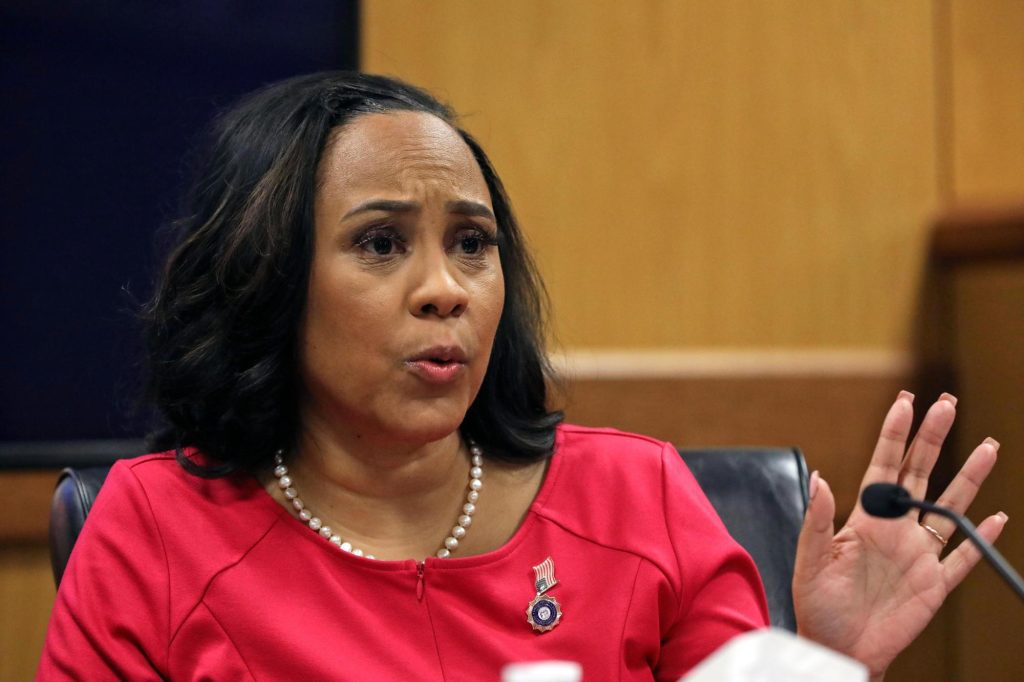By KATE BRUMBACK (Associated Press)
Fulton County District Attorney Fani Willis has been told by a judge to step away from the Georgia election interference case against Donald Trump, or remove the special prosecutor she had a romantic relationship with before the case can continue. The judge in charge ruled on Friday.
The judge, Scott McAfee, did not find that Willis’ relationship with special prosecutor Nathan Wade was a conflict of interest that should disqualify her from one of four criminal cases against the Republican former president.
But, the judge said it created an “appearance of impropriety” that affected the prosecution team, and he questioned the truthfulness of Willis and Wade’s testimony about the timing of their relationship.
The judge wrote that as the case progresses, members of the public could easily wonder whether the financial exchanges have continued resulting in some benefit to the District Attorney, or even whether the romantic relationship has resumed.
In other words, an outsider could reasonably think that the District Attorney is not exercising her independent professional judgment totally free of any compromising influences, as long as Wade remains on the case.
A spokesperson for Willis did not immediately respond to a text message seeking comment Friday.
An attorney for Trump said they respect the court’s decision but believe the judge “did not afford appropriate significance to the prosecutorial misconduct of Willis and Wade.”
Defense attorney Steve Sadow said, “We will use all legal options available as we continue to fight to end this case, which should never have been brought in the first place.”
Willis hired Wade to lead the team to investigate and ultimately prosecute Trump and 18 others accused of participating in a wide-ranging scheme to illegally try to overturn Trump’s narrow loss to Democrat Joe Biden in Georgia in 2020. Willis and Wade testified at a hearing last month that they had engaged in a romantic relationship, but they rejected the idea that Willis improperly benefited from it, as lawyers for Trump and some of his co-defendants alleged.
McAfee wrote that there was insufficient evidence that Willis had a personal stake in the prosecution. But he condemned what he described as a “tremendous” lapse in judgment and the “unprofessional manner of the District Attorney’s testimony.”
The judge said he was unable to “conclusively establish by a preponderance of the evidence” whether Willis and Wade began dating before or after he was hired as special prosecutor.
The judge wrote, “However, an odor of mendacity remains.” He said “reasonable questions” about whether Willis and Wade testified truthfully about the timing of their relationship “further underpin the finding of an appearance of impropriety and the need to make proportional efforts to cure it.”
He also said that dismissal of the case was not the right solution to get rid of the financial cloud of impropriety and potential untruthfulness found here.
McAfee did not find any evidence that the rights of Trump and the other defendants to fair legal procedures were violated or that the issues involved harmed them in any way. He also stated that removing a government official from a case is not necessary if there are other less severe options available.
The judge expressed his belief that under Georgia law, simply making bad choices, even repeatedly, does not constitute a genuine conflict. He also emphasized that the trial court must focus on the relevant issues and applicable laws.
An attorney representing co-defendant Michael Roman requested McAfee to dismiss the indictment and stop Willis and Wade from prosecuting the case. The attorney, Ashleigh Merchant, claimed that Willis paid Wade large amounts for his work and then benefited improperly from the prosecution of the case when Wade used his earnings to pay for vacations for both of them.
Willis maintained that the relationship did not create any financial or personal conflict of interest that warranted removing her office from the case. She and Wade testified that their relationship began in spring 2022 and ended in summer 2023. They both stated that Willis either paid for things herself or used cash to reimburse Wade for travel expenses.
The extensive indictment accuses Trump and over a dozen other defendants of violating Georgia’s Racketeer Influenced and Corrupt Organizations Act, known as RICO. The case applies a law typically associated with mobsters to accuse the former president, lawyers, and other aides of a “criminal enterprise” to keep him in power after he lost the 2020 election to Democrat Joe Biden.
Trump, the presumptive presidential nominee for the Republican Party in 2024, has denied any wrongdoing and pleaded not guilty.
Earlier this week, the judge dismissed some of the charges against Trump.
The six counts being challenged accused the defendants of persuading public officers to violate their oaths. One count was related to a phone call Trump made to Georgia Secretary of State Brad Raffensperger, a fellow Republican, on Jan. 2, 2021, in which Trump urged Raffensperger to “find 11,780 votes” for him to win the election in the state.
Another count that was dropped accused Trump of urging then-Georgia House Speaker David Ralston to violate his oath of office by calling a special session of the legislature to unlawfully appoint presidential electors.
McAfee stated that the counts did not provide enough detail about the nature of the violations.









